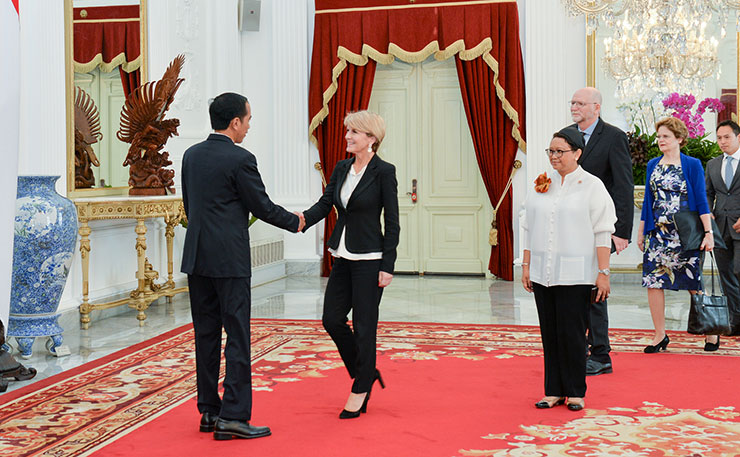Australia needs to lift its efforts if it’s to develop a strong relationship with a nation that will have one of the largest economies in the world by 2030, writes Alexander Horton.
Foreign Affairs Minister, Julie Bishop finished her 2-day visit to Indonesia last month in what was described as an opportunity to deepen progress on issues such as economic engagement, security relations, maritime affairs and counter-terrorism efforts.
The 8th foreign visit by the foreign affairs minister represents stabilization in what have historically been rocky bilateral relations, with Bishop claiming Australia’s relationship with Indonesia has “probably never been stronger”.
The majority of the dialogue focused on issues pertaining to security relations, maritime affairs and counter terrorism efforts. Mere lip service was paid to economic engagement between the Foreign affairs minister and her counterparts with media releases signifying little development in economic relations between the two nations.
Australia’s security relationship with Indonesia has become a cornerstone of its security policy in the Asia-Pacific, largely due to the fact that Indonesia supports Australia’s stance on ensuring open and free shipping lanes in the South China Sea.
Whilst maintaining strong maritime and security relationships as well as sharing intelligence for issues such as counterterrorism is vital for the two nations, without making advances in ensuring open trade of commerce and industry the deepening of such relationships is done in vain.
Ms Bishop would have been wise to use the Indonesian visit as another opportunity to explore trade opportunities and possibilities.
Labor Treasurer spokesman, Chris Bowen recently commented that Australia needed to ramp up its economic engagement with Indonesia labeling current levels “scandously low”. Despite being Australia’s closest partner in the Indo-Pacific region, Indonesia only ranks as its 12th largest trading partner – Bowen’s comments are not too far off the mark.
With a population of 250 million, a growing middle class with expanding consumer interests and a GDP that is tipped to be the 7th largest by 2030, it is vital that Australia takes every opportunity it has to maintain momentum in Indonesia-Australia economic relations.
It should be noted that important progress has been made in the realm of economic engagement in the past three years. Both countries are in the G20, an invaluable opportunity for Indonesia and Australia to understand wider economic trends that could lead to mutual economic advantage.
March of this year saw Australia and Indonesia’s trade ministers re-engage on the Indonesia-Australia Comprehensive Economic Partnership Agreement (IA-CEPA) with a successive round of negotiations being held in August.
Lastly, representatives from Indonesia and Australia met in Yogyakarta for the 3rd Indonesia-Australia dialogue in the same month to exchange ideas about global and regional politics, the state of the nations’ economies and opportunities for innovation in business, science and technology.
With the ratification of the IA-CEPA touted to be completed by 2018 and another Indonesia-Australia dialogue scheduled for the same year, there is no doubt that Australia’s economic relationship with Indonesia is taking great strides.
Nonetheless, if the relationship is to gain meaningful economic outcomes, it is vital that Australia’s foreign service pursues a far more targeted approach, tailored to the interests and needs of Indonesia’s economy as well as promoting services that encourage people-to-people ties.
The economic development policy of current Indonesian President Joko Widodo (Jokowi) has been built on a mandate of economic nationalism – inwards facing policies that have been designed to protect Indonesian business from foreign competition.
This has mainly been achieved through utilizing state-owned enterprises (SOEs) in order to implement infrastructure projects Jokowi sees vital to building Indonesia’s economy. With the lofty goal of bringing Indonesia’s economic growth rate to 7 per cent, it is unlikely that Jokowi will be able to implement his economic legacy on his own. Foreign direct investment is likely to play a key part and due to the proximity of the two countries, Australia should be primed to take advantage of such circumstances.
As a resource, service-based economy, the need for infrastructure development seems to be an excellent opportunity for our nation, providing a means for Australian contractors with experience in delivering large-scale projects to expand overseas.
It would prove wise for Australia to additionally look to opportunities that are able to develop vital people-to-people links and provide a platform for a greater working relationship with Indonesia in the future. Building on the success of the New Colombo plan through further encouraging student-to-student interaction would aid in fostering a more nuanced cultural understanding between future delegates.
Another area Australia can make improvements is utilizing its broad research base of academics and scientists to help innovation, policy construction and development in Indonesian sectors as wide-ranging as science, technology and agriculture.
Leveraging such advantages is a practical approach to overcoming any barriers that may be in existence due to Indonesia’s inwards looking economic development policy.
Implementing such agreements is likely to be a long, arduous process, as it will require cooperation from Indonesia’s often-ineffective bureaucracy in order to establish initial links. This is why Australia must take every opportunity it has -including Bishop’s most recent foreign visit – to continue momentum in economic relations.
Through adopting a more targeted approach in setting up new economic links, Australia’s foreign service will be in a better position to get initial links established.
Donate To New Matilda
New Matilda is a small, independent media outlet. We survive through reader contributions, and never losing a lawsuit. If you got something from this article, giving something back helps us to continue speaking truth to power. Every little bit counts.





